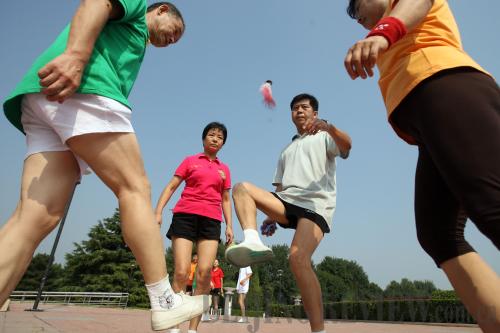|
 |
|
GETTING INVOLVED: Beijing residents kick shuttlecock in Chaoyang Park on August 8, 2010, the Second National Fitness Day (CFP) |
The first edition of broadcast calisthenics was introduced in 1951, when millions of people across the country did exercises to the rhythm of music from China National Radio. Since then, every five to 10 years, the national exercises are switched up according to social development and people's physical conditions. In 1981, the sixth edition of broadcast calisthenics was launched, the seventh in 1990 and the eighth in 1997.
In an attempt to further improve citizens' health, China released its ninth edition of broadcast calisthenics on August 8, 2011, to promote national fitness as the past eight programs did.
"The new calisthenics, which took researchers one year to devise and modify, are some of the most economical, practical and scientific ways to exercise the body," said Feng Jianzhong, Vice Director of the GAS.
Zhang Ping, deputy leader of the group that designed the new regimen, said the calisthenics take about four minutes to complete and will help participants cope with the pressures associated with modern life. They will also help to prevent obesity and high cholesterol, which are becoming common among Chinese students and adults.
Youth concerns
Despite China's success at the Beijing Olympic Games and its young people's rising enthusiasm for sports, a troubling reality cannot be ignored: Chinese people, especially its younger generations, have relatively poor physical fitness compared to that of people in developed countries.
A survey of college students in more than 10 cities earlier this year by the Chinese Health Education Center found that more than 50 percent of respondents do not exercise enough.
Researchers discovered roughly 23 percent were lighter than the ideal weight recommended as healthy by the Ministry of Education and sports administration, while 13 percent were overweight.
A separate study released last year by the Ministry of Education also showed only 21 percent of primary and junior middle schools enforce the minimum exercise time of at least one hour per day. About 56 percent of primary schools and 76 percent of junior middle schools do not arrange enough physical education classes, the report said.
According to the Chinese Association for Student Nutrition and Health Promotion, China had 12 million overweight children in 2011, accounting for about 7 percent of the global total.
In Beijing alone, the number of overweight primary and middle school students hit 20.7 percent in 2011, according to the Beijing Municipal Bureau of Health.
"It's obvious that the physical fitness of students has worsened in recent decades," said Wang Heping, a teacher at the Beijing-based University of International Business and Economics. "The biggest drops are in endurance and strength, while flexibility is also very bad."
Yang Yang, the retired speed skater who won China's first Winter Olympics gold medal, suggested holding school officials accountable for the amount of exercise children receive at primary and middle school.
To ensure youngsters get at least an hour of sport each day, principals and education departments should be punished if schools do not meet the requirement, she said.
Email us at: yinpumin@bjreview.com | 